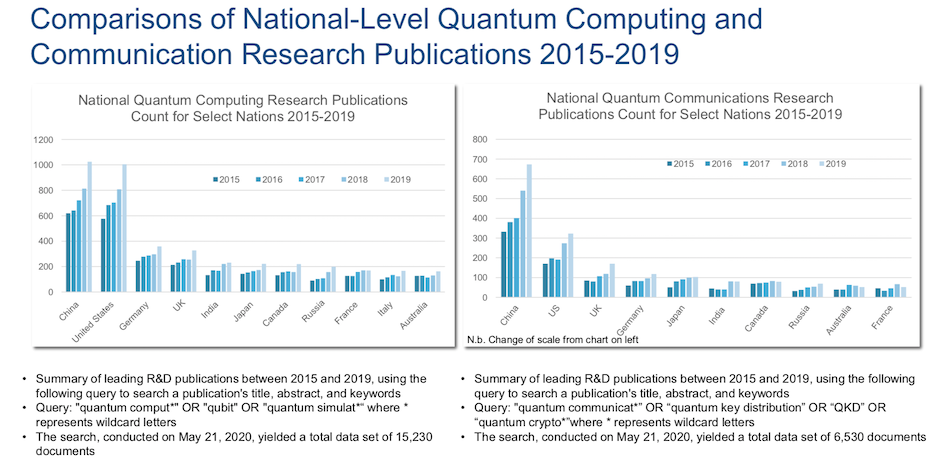The nascent quantum computer (QC) market will grow 27 percent annually (CAGR) reaching $830 million in 2024 according to an update provided today by analyst firm Hyperion Research at the HPC User Forum being held this week. Interestingly, a study of potential QC user expectations by Hyperion pegged spending at $1 billion for 2024. Perhaps most important is that a QC market update made it onto the conference agenda at all.
To a significant extent, despite the presence of commercial players, quantum computing has been a fascinating but largely R&D effort in recent years. Spurred by its promise and the fear of being left behind, an intense global race to achieve practical quantum computing has emerged. The title of presenter Bob Sorensen’s talk today – Quantum Computing: Finding Its Place in the Advanced Computing Sector – captures both the reality and aspiration of the quantum community.
Forget, for a moment, the formidable remaining QC technical challenges, which Sorensen did not dwell on. “One of the things I want you to take away from this little presentation today is the concept that quantum computing is a national level phenomenon. It’s being conducted around the world in a way that I don’t think we see a lot of other technologies blossoming as quickly and as broadly,” said Sorensen, Hyperion’s chief analyst for quantum computing.
Sorensen didn’t dig into quantum technology’s details beyond noting that Shor’s algorithm (factoring) and its potential use in cryptography was a key spark in stimulating the bloom in quantum development. “The issue here is that computers are very good at multiplying, but they’re actually terrible at dividing. And figuring out prime numbers’ factors can be quite daunting, which is one of the reasons why it’s fundamental to most of the encryption algorithms that are around today. Let me just give you a sense of why quantum computing became so popular. It all started with Peter Shor and some of the work he did at AT&T early on,” said Sorensen.
As shown below in this chart, Shor’s algorithm run on a quantum system would be much faster than classical for factoring large prime numbers.
Today there are many application areas in which quantum computing’s capabilities are expected to surpass those of classical systems. “[The] most prominent [applications] today include physical simulation in areas such as material science, chemistry, pharmaceuticals, and even oil and gas. There’s lots of interesting work going on right now in terms of using quantum computing to advance the state of the art in machine learning as well as optimization. The key issue is that that list grows longer every day,” he said.
This potential payoff (and risk of ignoring the trend) has prompted quantum computing’s resurgence.
“What these two charts (above) show you is that fundamentally there are a number of nations who are publishing quantum computing and quantum communications research. The United States and China are certainly taking the lead, but there are a number of nations involved at significant levels of activity as well,” he said.
Given the size of the international effort (funding), the expanding ecosystem (hardware, software, and consulting companies/organizations), and sheer number of researchers attacking quantum computing writ large, the big bet is that this army of workers will steadily knock down the obstacles to practical quantum computing. To some extent, the steady flow of quantum advances has bolstered this sense of inevitable QC success. (See HPCwire article, Fast Pass Through (Some of) the Quantum Landscape with ORNL’s Raphael Pooser, for examples of progress.)
One metric often held up as an indicator of commercial readiness is so-called quantum supremacy (QS) – the ability of a quantum computer to perform, a calculation that cannot realistically be done on classical. Google and a group of researchers in China have reported achieving QS but many observers say QS is less important than achieving quantum advantage (QA). Sorensen presented data indicating potential users are focused more on practicality rather than some theoretical ultimate capability.
“When you talk to the user base, you’ll find they’re not interested in quantum supremacy. Forty-two percent of them only want 50x performance or greater on some of their existing applications to really consider using quantum. We find that while the quantum computing suppliers are perhaps over emphasizing some of the more esoteric aspects of quantum computing capability, there is much more modest performance gains expectation wise from the potential end users,” he said. “From a user perspective, there certainly is a lot of hope and optimism for the sector to go forward.”
Sorensen was quick to emphasize he doesn’t see quantum computing replacing traditional computing but instead acting as specialized accelerators for particular problem, much as other chip accelerators such as GPUs do today.
“If we had a chance to go back and rename quantum computing, I would much rather think about it right now as a quantum accelerator, the ability to basically boost performance on a narrow range of classical computing capability, but with very, very high rate of return. So that’s really the takeaway message. There’s lots of interesting work going forward, lots of work to be done,” he said. (Link to sampling of quantum technology players.)
Slides from Bob Sorensen’s presentation at the HPC User Forum


































































